
Jeffrey Lynne is an English musician, singer-songwriter and record producer. He is the co-founder and currently the sole member of the rock band Electric Light Orchestra (ELO), which was formed in 1970, and as a songwriter has written most of the band's hits, including "Evil Woman", "Livin' Thing", "Telephone Line", "Mr. Blue Sky", "Don't Bring Me Down" and "Hold On Tight".

Please Please Me is the debut studio album by the English rock band the Beatles. Produced by George Martin, it was released in the UK on EMI's Parlophone label on 22 March 1963. The album is 14 songs in length, and contains a mixture of cover songs and original material written by the partnership of band members John Lennon and Paul McCartney.
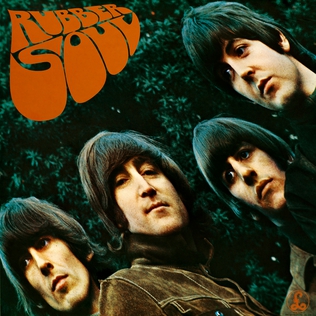
Rubber Soul is the sixth studio album by the English rock band the Beatles. It was released on 3 December 1965 in the United Kingdom on EMI's Parlophone label, accompanied by the non-album double A-side single "Day Tripper" / "We Can Work It Out". The original North American release, issued by Capitol Records, contains ten of the fourteen songs and two tracks withheld from the band's Help! (1965) album. Rubber Soul was described as an important artistic achievement by the band, meeting a highly favourable critical response and topping sales charts in Britain and the United States for several weeks.

"I Am the Walrus" is a song by the English rock band the Beatles from their 1967 television film Magical Mystery Tour. Written by John Lennon and credited to Lennon–McCartney, it was released as the B-side to the single "Hello, Goodbye" and on the Magical Mystery Tour EP and album. In the film, the song underscores a segment in which the band mime to the recording at a deserted airfield.

What's Going On is the eleventh studio album by American soul singer Marvin Gaye. It was released on May 21, 1971, by the Motown Records subsidiary label Tamla. Recorded between 1970 and 1971 in sessions at Hitsville U.S.A., Golden World, United Sound Studios in Detroit, and at The Sound Factory in West Hollywood, California, it was Gaye's first album to credit him as producer and to credit Motown's in-house session musicians, known as the Funk Brothers.

"Twist and Shout" is a 1961 song written by Phil Medley and Bert Berns. It was originally recorded by the Top Notes, but it did not become a hit in the record charts until it was reworked by the Isley Brothers in 1962. The song has been covered by several artists, including the Beatles, Salt-N-Pepa, The Astronauts and Chaka Demus & Pliers, who experienced chart success with their versions.

The Wonder Stuff are a British alternative rock band. Originally based in Stourbridge in the West Midlands, England, the band's first lineup released four albums and nearly 20 singles and EPs, enjoying considerable chart and live success in the UK. The band have continued to tour and record since 2000.
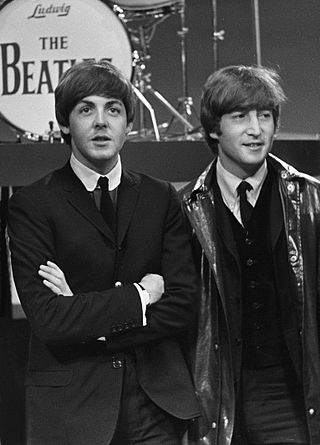
Lennon–McCartney was the songwriting partnership between English musicians John Lennon and Paul McCartney of the Beatles. It is widely considered one of the greatest, best known and most successful musical collaborations ever by records sold, with the Beatles selling over 600 million records worldwide as of 2004. Between 5 October 1962 and 8 May 1970, the partnership published approximately 180 jointly credited songs, of which the vast majority were recorded by the Beatles, forming the bulk of their catalogue.

Red Rose Speedway is the second studio album by the English-American rock band Wings, although credited to "Paul McCartney and Wings". It was released through Apple Records on 4 May 1973, preceded by its lead single, the ballad "My Love". By including McCartney's name in the artist credit, the single and album broke with the tradition of Wings' previous records. The change was made in the belief that the public's unfamiliarity with the band had been responsible for the weak commercial performance of the group's 1971 debut album Wild Life.
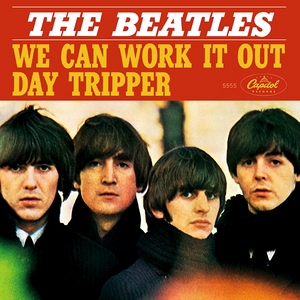
"We Can Work It Out" is a song by the English rock band the Beatles, written by Paul McCartney and John Lennon. It was first issued as a double A-side single with "Day Tripper" in December 1965. The song was recorded during the sessions for the band's Rubber Soul album. The single reached number one in Britain, the United States, Australia, Canada, and Ireland. In the UK, it was the seventh highest selling single of the 1960s.

A Toot and a Snore in '74 is a bootleg album consisting of the only known recording session in which John Lennon and Paul McCartney played together after the break-up of the Beatles in 1970. First mentioned by Lennon in a 1975 interview, more details were brought to light in May Pang's 1983 book, Loving John, and it gained wider prominence when McCartney made reference to the session in a 1997 interview. Talking with Australian writer Sean Sennett in his Soho office, McCartney said the "session was hazy... for a number of reasons".

"Real Love" is a song written by the English musician John Lennon, formerly of the Beatles. He recorded six demos of the song in 1979 and 1980 with "Real Life", a different song that merged with "Real Love". In 1988, the sixth take was posthumously released for the documentary soundtrack Imagine: John Lennon. In 1995, his demo was completed by his former Beatles bandmates as part of the Beatles Anthology project, along with "Free as a Bird".
The discography of English singer-songwriter and former Beatle George Harrison consists of 12 studio albums, two live albums, four compilation albums, 35 singles, two video albums and four box sets. Harrison's first solo releases – the Wonderwall Music film soundtrack (1968) and Electronic Sound (1969) – were almost entirely instrumental works, issued during the last two years of the Beatles' career. Following the band's break-up in April 1970, Harrison continued to produce recordings by his fellow Apple Records acts, notably former bandmate Ringo Starr. He recorded and collaborated with a wide range of artists, including Shankar, Bob Dylan, Eric Clapton and Gary Wright.
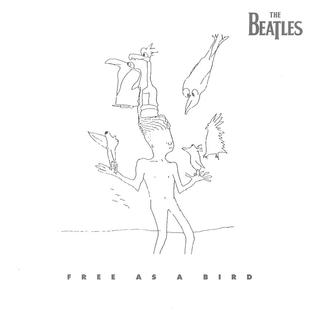
"Free as a Bird" is a single released in December 1995 by English rock band the Beatles. The song was originally written and recorded in 1977 as a home demo by John Lennon. In 1995, 25 years after their break-up and 15 years after Lennon's murder, his then surviving bandmates Paul McCartney, George Harrison and Ringo Starr released a studio version incorporating the demo.

Introducing Eddy and the Falcons is the second album by the English rock band Wizzard. It peaked at No. 19 in the UK Albums Chart – ten places higher than its predecessor, Wizzard Brew. As with the previous Wizzard album, all songs were composed by Roy Wood.
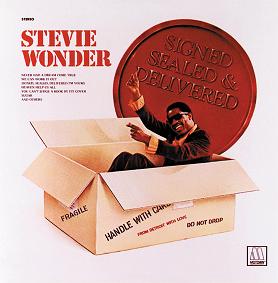
Signed, Sealed & Delivered is the 12th studio album by American recording artist Stevie Wonder, released on August 7, 1970, by Tamla Records. The album featured four hits that hit the Billboard Hot 100: "Signed, Sealed, Delivered I'm Yours", "Heaven Help Us All", "Never Had a Dream Come True" and Wonder's cover of The Beatles' "We Can Work It Out". The album hit No. 25 on the Billboard Pop Albums chart as well as No. 7 on the R&B Albums chart.
The Beatles Anthology is a documentary television series on the career of the Beatles. It was broadcast on UK television in six parts on ITV between 26 November and 31 December 1995, while in the United States it was seen as three feature-length episodes on ABC between 19 and 23 November 1995. It was released in greatly expanded form as an eight-volume VHS set and an eight-disc LaserDisc set on 5 September 1996. The series was re-released on DVD in 2003, with an 81-minute special-features disc.
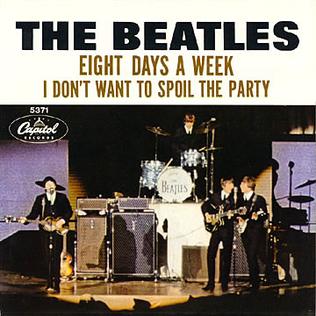
"Eight Days a Week" is a song by the English rock band the Beatles. It was written by Paul McCartney and John Lennon based on McCartney's original idea. It was released in December 1964 on the album Beatles for Sale, except in the United States and Canada, where it was first issued as a single A-side in February 1965 before appearing on the album Beatles VI. The song was the band's seventh number 1 single on the Billboard Hot 100, a run of US chart success achieved in just over a year. The single was also number 1 in Canada, Belgium and the Netherlands.

Let It Roll: Songs by George Harrison is the third compilation of songs recorded by the English singer-songwriter George Harrison, and the first to span his entire solo career after the Beatles era. The collection was announced on 14 April 2009, the same day that Harrison received a star on the Hollywood Walk of Fame, and was released 16 June 2009, on both CD and in digital format.
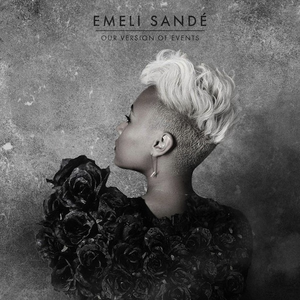
Our Version of Events is the debut studio album by Scottish recording artist Emeli Sandé. The album was released on 13 February 2012 by Virgin Records, following Sandé's winning of the Critics' Choice Award at the BRIT Awards 2012. Though Our Version of Events is her first album release, Sandé has been active in the industry since 2009, most notably appearing on singles by Chipmunk and Wiley. The album features R&B, soul and pop music.
















